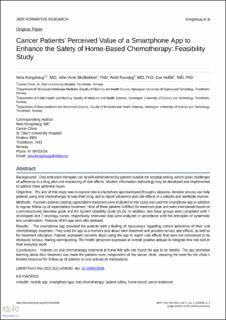| dc.description.abstract | Background:
Oral anticancer therapies can be self-administered by patients outside the hospital setting, which poses challenges of adherence to a drug plan and monitoring of side effects. Modern information technology may be developed and implemented to address these pertinent issues.
Objective:
The aim of this study was to explore how a smartphone app developed through a stepwise, iterative process can help patients using oral chemotherapy to take their drug, and to report adherence and side effects in a reliable and verifiable manner.
Methods:
Fourteen patients starting capecitabine treatment were included in this study and used the smartphone app in addition to regular follow up of capecitabine treatment. Nine of these patients fulfilled the treatment plan and were interviewed based on a semistructured interview guide and the System Usability Scale (SUS). In addition, two focus groups were completed with 7 oncologists and 7 oncology nurses, respectively. Interview data were analyzed in accordance with the principles of systematic text condensation. Features of the app were also assessed.
Results:
The smartphone app provided the patients with a feeling of reassurance regarding correct adherence of their oral chemotherapy treatment. They used the app as a memory tool about their treatment and possible serious side effects, as well as for treatment education. Patients expressed concerns about using the app to report side effects that were not considered to be obviously serious, fearing overreporting. The health personnel expressed an overall positive attitude to integrate this new tool in their everyday work.
Conclusions:
Patients on oral chemotherapy treatment at home felt safe and found the app to be helpful. The app promoted learning about their treatment and made the patients more independent of the cancer clinic, reducing the need for the clinic’s limited resources for follow up of patients on oral anticancer medications. | en_US |

